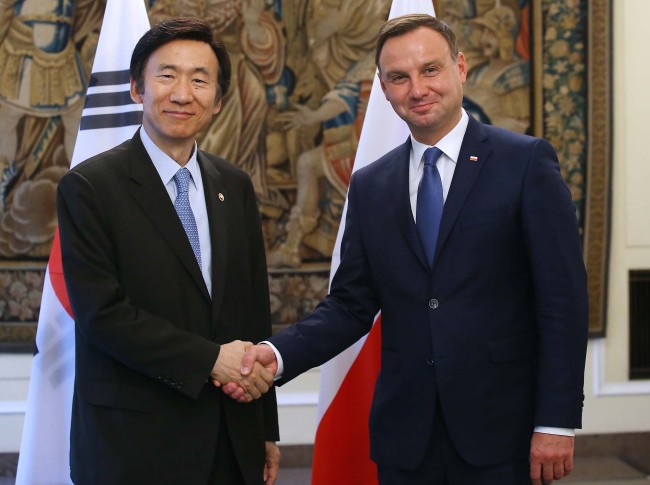 |
| South Korean Foreign Minister Yun Byung-se (left) shakes hands with Polish President-elect Andrzej Duda in Duda’s office in Warsaw, Poland, on Thursday. The meeting came a few hours after Yun’s meeting with his Polish counterpart, Grzegorz Schetyna. (Yonhap) |
South Korea and Poland will work together to establish peace and reconciliation on the divided Korean Peninsula, their foreign ministers agreed during a meeting in Warsaw, according to the Foreign Ministry on Thursday.
Foreign Minister Yun Byung-se and his Polish counterpart, Grzegorz Schetyna, held talks in the Polish capital Wednesday, during which they discussed a wide range of bilateral and global issues, including an inter-continental rail project involving both sides, the ministry said in a press release.
The Eurasia Express, which departed from Beijing and Vladivostok earlier this month, arrived in Warsaw on Wednesday after the two tour groups combined in Irkutsk.
Yun will join the final leg of the 14,400 kilometer journey to Berlin later Thursday.
During their talks, the South Korean minister explained the motivation behind the Seoul-led project, saying it is part of the Park Geun-hye administration’s efforts to forge closer ties across Eurasia, the ministry said.
He also thanked Poland for its cooperation on the project, stressing the significance of Poland’s participation as a gateway to Europe and a symbol of post-war reconciliation and prosperity.
“(Yun) expressed hope that just as Polish-German reconciliation served as a catalyst for peace and prosperity in Europe, peace and reconciliation would soon be established on the Korean Peninsula and in Northeast Asia, and asked for the Polish government’s interest and support,” the ministry said in the release.
Schetyna said he would work to contribute to peace and stability on the Korean Peninsula and in Northeast Asia, noting that Poland has shared the Polish-German experience with South Korea.
The two sides also discussed their countries’ growing economic ties.
Yun asked for the Polish government’s support for South Korean businesses operating in Poland’s special economic zones and greater interest and support for cooperation in defense, health and transportation.
Schetyna said Poland considers South Korea a “key partner” in Asia, encouraging more investment from South Korean firms and new areas of cooperation in science and technology.
Their meeting was the first between the two countries’ foreign ministers in seven years.
During his visit to the Historical Museum of Warsaw, Yun said North Asia should learn lessons from post-war reconciliation efforts by Germany and Poland to face the dark history and to take steps toward peace, in a thinly-veiled remark pointed at Japan’s denial of its wartime atrocities.
“The case of reconciliation between Poland and Germany gives a clear lesson,” Yun said in a speech at the forum held at the museum. “By confronting the past and holding out the olive branch, we can be relieved from historical burden and open a new era of peace and prosperity.”
After a stay in Berlin, meanwhile, Yun plans to visit the headquarters of the International Atomic Energy Agency in Vienna on Saturday, his ministry said.
He will meet with IAEA Director-General Yukiya Amano to discuss pending issues.
“Minister Yun will listen to the IAEA’s role in implementing the Iranian nuclear deal, such as verification, and exchange opinions on the agreement’s impact on the international nonproliferation system,” the ministry said. “And he will discuss ways for continued cooperation for a resolution to the North Korean nuclear program.”
The minister also plans to talk about partnerships between the IAEA and South Korea, the world’s fifth nuclear energy power, it added.
Yun will then head to Zurich for a flight back to Seoul later Saturday.
It will be the minister’s first visit to the IAEA since taking office in early 2013. (Yonhap)



